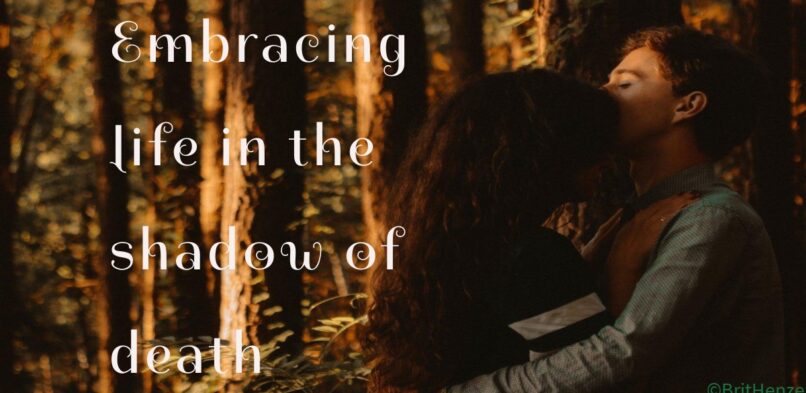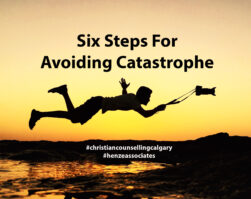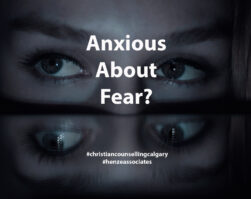One of the weirdest rituals Christian religious leaders perform seems to happen at nearly every funeral: The service is drawing to a close when either the Reverend or someone else stands up to do a Scripture reading taken from Psalm 23:
“The Lord is my shepherd; I shall not want. He maketh me to lie down in green pastures; He leadeth me beside the still waters. He restoreth my soul; He leadeth me in the paths of righteousness for His name’s sake. Yea, though I walk through the valley of the shadow of death, I will fear no evil; for Thou art with me…”
It’s weird, because those verses have nothing to do with a funeral. It’s not about dying. It’s about the living, and what it means to live in the face of threats to your own life or someone you care about.
That passage is about embracing life, even in the valley of the shadow of death.
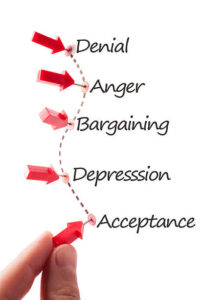 The strangeness of that tradition really shouldn’t come as much of a surprise. Our society has always had a complicated relationship with death and has chronically misused all sorts of things. For example, the famous Kubler-Ross Five Stages of Grief model (denial, anger, bargaining, depression, and acceptance) actually described the steps of dying and never should have been applied to those who have just lost a loved one. And, even when we look at many of the more modern treatments popular in Calgary counselling for grief and loss, the relational elements of death are mostly ignored.
The strangeness of that tradition really shouldn’t come as much of a surprise. Our society has always had a complicated relationship with death and has chronically misused all sorts of things. For example, the famous Kubler-Ross Five Stages of Grief model (denial, anger, bargaining, depression, and acceptance) actually described the steps of dying and never should have been applied to those who have just lost a loved one. And, even when we look at many of the more modern treatments popular in Calgary counselling for grief and loss, the relational elements of death are mostly ignored.
Yet, grief and loss counselling is still among the most common reasons anyone will visit a Calgary counselling centre. Death, or at least the possibility of it, is a reality in all of our lives and shapes virtually every aspect of living. We’re all aware that medicine doesn’t save lives; it just delays death. The majority of anxiety disorders relate to safety and/or loss of life. The foundational essence of our innate search for meaning and transcendence is the awareness that two hundred years from now, likely no one will know you even existed, much less care.
We all daily walk through the valley of the shadow of death, not around it.
 However, we seldom face that reality. North America is mostly a death-denying society, and the majority of us live in nearly constant denial of our mortality, particularly when we are young. In the first couple of decades of life, living seems endless. Experiences are valued over deep connections or gratifying relationships, while foolish risks are taken nearly without thought. In the area of bereavement, men’s counselling Calgary specialists often report massive substance abuse, while grief-related emotional repression is a primary reason for admission to the many depression treatment centers Alberta offers.
However, we seldom face that reality. North America is mostly a death-denying society, and the majority of us live in nearly constant denial of our mortality, particularly when we are young. In the first couple of decades of life, living seems endless. Experiences are valued over deep connections or gratifying relationships, while foolish risks are taken nearly without thought. In the area of bereavement, men’s counselling Calgary specialists often report massive substance abuse, while grief-related emotional repression is a primary reason for admission to the many depression treatment centers Alberta offers.
However, that denial only holds firm up to where someone we care about receives a life-threatening or even terminal diagnosis.
 Then, a polar shift suddenly occurs. Biblical authors describe this shift as having made an alliance with the Spirit of Death. Freud described this as forsaking Eros (The god of life) and succumbing to Thanatos (the god of death.) We can use whatever terms to explain it, but as a diagnosis of a potentially terminal illness destroys that denial of death, it often also causes us to forsake living.
Then, a polar shift suddenly occurs. Biblical authors describe this shift as having made an alliance with the Spirit of Death. Freud described this as forsaking Eros (The god of life) and succumbing to Thanatos (the god of death.) We can use whatever terms to explain it, but as a diagnosis of a potentially terminal illness destroys that denial of death, it often also causes us to forsake living.
We go from denying the possibility of death to a hyper-focus on it. Friends and family start to pull back or behave strangely. Emotions of panic, sorrow and loss spike to unmanageable levels at the very thought of losing someone we love. Rather than face those feelings of dread and anguish, we suppress them to, “Be strong for the person,” teaching them that their own emotions are unacceptable and that they should stop causing us pain. Rather than live our feelings honestly and authentically alongside the person, we commence grieving their loss as though they were already gone – sometimes even after their lives are no longer immediately threatened.
We cease to embrace life, and embrace death.
 The even stranger thing is, most people believe this is what the person needs, and that they are caring for their loved one in the best way possible. Yet, the best counselling Calgary has to offer in the area of life-defining or terminal illness embraces something completely different. It starts with understanding people and the process of loss enough to allow people to be themselves and focuses on living and building relationships, not dying. While death is a reality for all of us, facing the potential of it with another is very different from suffering the loss of that other.
The even stranger thing is, most people believe this is what the person needs, and that they are caring for their loved one in the best way possible. Yet, the best counselling Calgary has to offer in the area of life-defining or terminal illness embraces something completely different. It starts with understanding people and the process of loss enough to allow people to be themselves and focuses on living and building relationships, not dying. While death is a reality for all of us, facing the potential of it with another is very different from suffering the loss of that other.
While a person facing the end of life may or may not be walking through Kubler-Ross’ five stages of denial, anger, bargaining, depression, and acceptance, those journeying alongside them will be walking a very different path. They are on what is often a chaotic path that tends to swing back and forth along two principal axes. While messy, it doesn’t need to be as confusing as it often feels, and understanding what is going on can often be the beginning of an alliance with life, even in the face of life-defining illness.
Picture it like this:
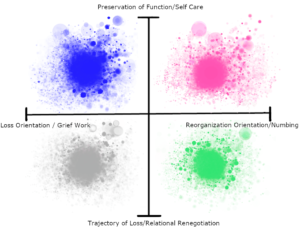
Horizontal Axis:
The first axis the majority of our Calgary counselling clients move back and forth on has Loss Orientation at one end and a Restoration Orientation at the other – an axis which is sometimes termed the Dual Process model of grief.
Loss Orientation:
When people focus on loss related stressors, they usually encounter the more intrusive aspects of possible or impending loss. They are focused on the bonds or ties with another that have been severed or may need to be undone in the future. They may alternately avoid and then face various elements of the change process and can often check off enough diagnostic criteria that they may even appear to pass a depression test.
When clients in this state seek a psychologist, they are usually there because of a desire to dive into classical grief work and have often been referred there by the Calgary Depression Hotline or one of the many depression doctors Calgary has to offer.
Restoration Orientation:
 When clients focus on restoration related issues, they are generally concentrated on secondary stressors and trying to escape from them. This end of the axis is not as much about the person they may or have already lost but more about having to rebuild elements of their life. People coming to our Calgary counselling center in this state have usually been sent there by friends and family concerned about the degree to which they have been trying to numb their pain.
When clients focus on restoration related issues, they are generally concentrated on secondary stressors and trying to escape from them. This end of the axis is not as much about the person they may or have already lost but more about having to rebuild elements of their life. People coming to our Calgary counselling center in this state have usually been sent there by friends and family concerned about the degree to which they have been trying to numb their pain.
They are overwhelmed by trying to figure out how to be a single parent, cope with huge responsibilities of end-of-life-care, manage finances (or other tasks,) struggle with feelings of isolation or loneliness, and want relief by whatever means available. (Often this includes endless hours of video gaming, drugs or alcohol, binging on NetFlix or even less socially acceptable vices.)
Vertical Axis:
The second axis our Calgary counselling clients move up and down on as they face the possible loss of a loved one is often termed the Two-Track Model. It has a focus on Physical, Mental and Social Functioning at the top and Relational Reorganization at the bottom.
Physical, Mental and Social Function:
 We exist in a relational support network, which is often entirely invisible to us until we face the possible loss of it. When that support system begins to crumble, we regularly exhibit a traumatic response that can include crippling depression, anxiety, and somatic concerns. We reevaluate our strengths, weaknesses, and general ability to continue to perform our employment and family-related roles.
We exist in a relational support network, which is often entirely invisible to us until we face the possible loss of it. When that support system begins to crumble, we regularly exhibit a traumatic response that can include crippling depression, anxiety, and somatic concerns. We reevaluate our strengths, weaknesses, and general ability to continue to perform our employment and family-related roles.
This area is as much about preserving our ability to function as it is about re-evaluating self-worth and systems of meaning and relational value. At this stage of their journey, clients have often exhausted many of the self-help anxiety and depression resources before reaching out for psychological services.
Relational Reorganization:
Consciously or unconsciously, we have all formulated a narrative or a story of our lives. As long as things go reasonably as we planned, we feel a sense of fit or coherence with that narrative. However, when someone we love faces life-defining or even terminal illness, our relationship with that person is forced to continually adapt. Every day, we wake up assessing the trajectory of potential loss asking, “What is the nature of my relationship with this person today?”
There are periods of emotional closeness interspersed with conflict and negative feelings or perceptions of the other. We continually seek to reconnect, while unconsciously memorializing what was lost and trying to make sense of what our new relationship with this person means in the overall narrative of our lives.

Intersecting Systems:
These two axes intersect and, as we independently move up or down/back and forth on them, this creates what Calgary depression support groups and grief support programs describe as, “Being at different places in the grieving process.” None of those places are any worse or better than the other. All of them need to be explored both personally and in relationship with our loved ones to embrace life. The only real danger is parking in any of them for too long.
While that information is a useful and necessary foundation, the path is much more than the psychological details. Breaking an alliance with death requires so much more than just a technical understanding of what is involved in facing a life-defining illness. Forming an alliance with life and developing any sort of transcendent meaning in the dark places of our lives is always a profoundly spiritual and relational journey that is usually focused on restoring coherence in four critical areas of our life story:
(1). Restoration of coherence in our relationship with God:
 At least here in North America, we all tend to cling to the same narrative of how life is supposed to go. We are born, we grow up, marry, have children, live in good health to old age and then die peacefully in our sleep, having lived a rich and full life. When life-defining illness enters that picture at a much earlier age, our anger almost inevitably turns on God – and with it, false guilt.
At least here in North America, we all tend to cling to the same narrative of how life is supposed to go. We are born, we grow up, marry, have children, live in good health to old age and then die peacefully in our sleep, having lived a rich and full life. When life-defining illness enters that picture at a much earlier age, our anger almost inevitably turns on God – and with it, false guilt.
The guilt, of course, is entirely unnecessary. Any god that cannot contain human rage is clearly a human invention. A good part of the Book of Psalms is filled with person after person fully screaming at God in their pain. Yet, years of religious instruction leave many unable to be honest with the fiery internal cocktail of blended rage and trust that comes as we rework our relationship with God.
It’s only when we finally unleash our entire arsenal of rage directly at God that we discover how unrelentingly He loves us for our honesty. It’s only then that we can begin to rework what it means to trust and begin to rewrite our narrative of relationship with God.
(2). Restoration of coherence in our relationship with ourselves:
 All of us have fabricated a false self that we present to others hoping that it will earn their acceptance. We pretend we are fine when we are angry, blame others when we feel out of control and flash a smile when we are hurting. We present this false image of ourselves because our distressing and painful childhood experiences have taught us that authenticity and congruence are unsafe, and vulnerability will only reveal how defective, flawed and unworthy of being loved we are.
All of us have fabricated a false self that we present to others hoping that it will earn their acceptance. We pretend we are fine when we are angry, blame others when we feel out of control and flash a smile when we are hurting. We present this false image of ourselves because our distressing and painful childhood experiences have taught us that authenticity and congruence are unsafe, and vulnerability will only reveal how defective, flawed and unworthy of being loved we are.
While we may delude ourselves into believing that this keeps us powerful and in control, what it really does is cut us off from ourselves and those we love. Those we love end up wounded twice: We wound them first by our absence, and then by way of the anger we direct towards their (often control driven) attempts to get their needs met.
Facing life-defining illness and death has an uncanny ability to tear apart our facade and force us to meet both our pain and the ways we have chosen to cope with it. It provides a theatre in which we can learn to attend to ourselves and discover how to reveal our tender feelings in ways that allow our longings to be met, instead of continuing to live out of our false selves. And, it can open our eyes to the sometimes damaging ways we have impacted others as well.
(3). Restoration of coherence in our relationship with others:
The vast majority of literature written about potential end of life experiences deals only with internal or intrapersonal aspects of grief and loss. In the rare cases where these authors even consider social and relational issues, they mostly are concerned with how relationships help people cope. But, outside of academia’s ivory towers, most Calgary psychotherapists are much more focused on relationships.
A big part of the depression treatment Calgary palliative care centers offer addresses what they term “life review,” or “life reconciliation,” sessions. Initially, these are individual counselling sessions where people can review their lives and find a sense of completion or closure. However, they then shift in a profoundly relational direction where people are permitted to express their thoughts and feelings to those they love, to take responsibility and ask for forgiveness from those they have harmed and restore relationships with them. Therapists specializing in grief and loss often report their patients “hanging on” to life until they have made amends with those they have been hard on or cut-off from.
There is likely no human experience capable of more swiftly revealing the relational changes needed in our lives than the ordeal of walking with a loved one facing a potentially terminal illness. While some of that journey involves reconciliation and restoration of relationships, the more significant part is often about self-forgiveness. Without it, we often remain defensive and render ourselves unable to give or receive some good gifts of relationship.
(4). Restoration of coherence in intimate relationship:
In all of the couples counselling Calgary therapists offer to those facing end-of-life issues, little is more important than allowing them to be where they are at. Simply put, given the almost infinite number of places any person could be on both of the above axes, it is highly unlikely any couple will simultaneously find themselves at the same location on that graph as they work through their processes.
If one partner is in a restoration orientation and is mostly focused on maintaining the ability to function while the other is in deep grief and trying to sort out relationships with others, the first partner almost always finds him or herself accused of, “Not doing the work.” In my work as an Alberta Registered Christian Psychologist, many clients have talked about how some Calgary therapists depression treatments have reinforced the idea that, unless they are continually immersed in deep grief work, they are avoiding dealing with their losses. Not only is this untrue, it also dangerously ignores other equally essential elements of the dynamic process of adapting to loss.
 Sadly, academic literature in this area almost wholly neglects to study even how our interactions with others allow us to adjust to changing circumstances, much less how they can restore coherence in the larger narrative of our individual and shared lives. However ignored it may be though, little is more critical.
Sadly, academic literature in this area almost wholly neglects to study even how our interactions with others allow us to adjust to changing circumstances, much less how they can restore coherence in the larger narrative of our individual and shared lives. However ignored it may be though, little is more critical.
When we experience loss, we experience it in a myriad of relational contexts. We don’t need those closest to us to be in the same space at the same time. What we need is for them to listen and journey with us. In my experience providing marriage counselling to those who have lost children, the loss does not end the relationship. Their marriage relationship ends because the couple fails to remain connected in the face of the trauma.
Preserving the relationship is usually as simple as:
(1). Allowing your partner to be where they are in the grieving process.
(2). Continuing to share what is happening inside of your journey.
Reach out for Calgary Counselling Services today!
Let’s face it. When life is good and people are living well counselling is only something a few sage people pursue. It’s generally only when hearts are broken, and the world seems turned upside down that people start looking for help – and, things often look somewhat confusing by then. So, let’s keep it simple. The highest quality Counselling will never offer any less than the above holistic integration of spiritual, relational, interpersonal and technical understandings of how to walk through this most challenging journey. Book with our Calgary Counselling Centre today, and never settle for anything less than the above.
